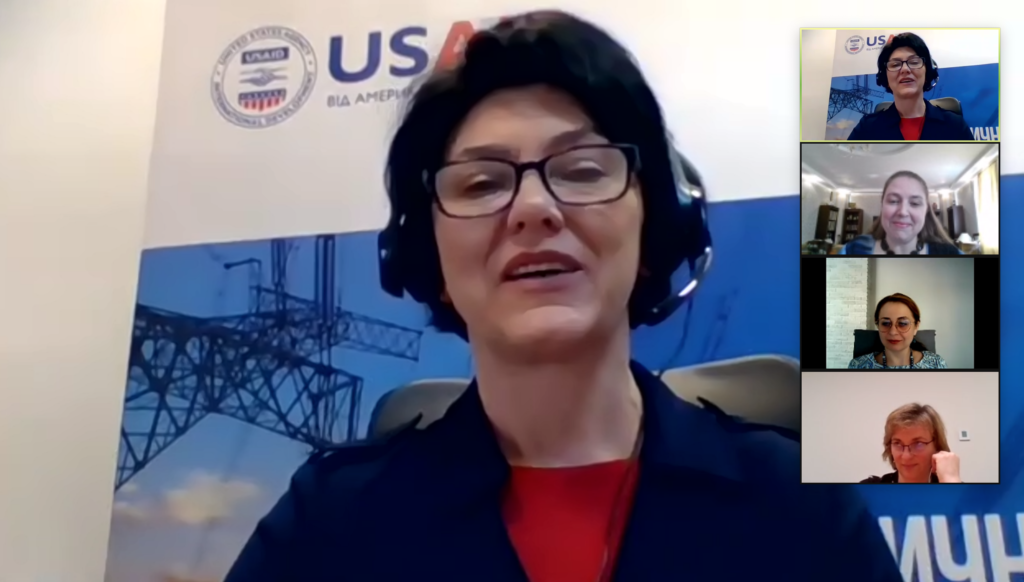On March 4, 2021, the United States Agency for International Development (USAID) Energy Security Project held its Third Annual Round Table dedicated to International Women’s Day to highlight inclusion and diversity across Ukraine’s energy sector and to reduce gender vulnerability in the context of COVID-19.

Ashley King, Energy Officer of the Office of Economic Growth at USAID/Ukraine, opened the event by stressing that “energy policies which do not consult women or include them in decision-making roles are simply less effective and can cause harm. Integrating gender considerations and ensuring women’s representation in COVID-19 response and recovery planning and decision-making in the energy sector is essential to enable women to advance rather than be left further behind by negative impacts from the pandemic. Post-COVID-19 economic recovery plans in Ukraine must include equitable access to and control over sustainable energy enterprises for both women and men as an essential right to development.”
Ms. King noted that the impact of COVID-19 has further stretched tight household budgets, requiring people to prioritize limited resources to pay for health-related costs at the expense of regular utility payments, which increases debts within the energy sector. “Female-headed households and women living in rural and remote areas are among the most at-risk groups affected by social distancing and quarantine measures. Women are earning less, saving less, and holding more insecure jobs,” she said, expressing the importance of improving the situation. “I am looking forward to hearing from my Ukrainian colleagues about how we can be a better partner in responding to the challenges that COVID 19 has presented to women in Ukraine.”

ESP’s Chief of Party, Dean White, noted the high level of participation and diversity at this year’s Round Table and said that “many companies in Ukraine, including Kyivteploenergo and Ukrenergo, are already making use of family-friendly flexible leave policies and working in new ways to maintain employee morale and support women.” According to Mr. White, the pandemic and eventual economic recovery could create an opportunity for energy companies and organizations to raise productivity by introducing more family-friendly work policies, promoting gender equality and women’s empowerment in the workplace, and protecting the most vulnerable groups.
The Deputy Minister of Energy, Yaroslav Demchenkov, affirmed that “the development of an effective COVID-19 recovery strategy includes sharing perspectives and experiences from the field and seeks to mobilize actions and funding to mitigate impacts while ensuring a gender lens to the coronavirus response is on the government’s agenda and it should be on the agenda of every energy company and others working in the sector.” He reported that 70 percent of personnel at the Ministry of Energy are women, who occupy 53 percent of management positions. Mr. Demchenkov also added that analytical surveys show job vulnerability is 1.8 times higher for women than for men.
Chairperson Lyudmila Buymister of the Subcommittee on Development of Competition and Equal Conditions for Business under the Verkhovna Rada’s Committee on Economic Development shared that “in connection with the spread of the coronavirus COVID-19, the Cabinet of Ministers of Ukraine, the Parliament and other authorities in Ukraine have adopted a number of regulatory documents affecting the activities of enterprises in the energy sector; at the same time, a lot of factors influencing women are still being taken into account to strengthen the role of women in the energy sector during outbreaks.”
Natalia Boyko, a member of Naftogaz’ supervisory board, said that during the pandemic, women in the energy sector appeared to be more protected than in many other industries. Because uninterrupted energy system operation is of critical importance, there were no shutdowns, layoffs, or forced vacations. Ms. Boyko felt that this could be a good argument for promoting the energy sector among women.
Anastasia Kovalska, Deputy Head of the Human Resources Department of the GTS Operator of Ukraine, opined that “the criterion of gender should not be a marker of ‘friend-or-foe,’ especially in the professional sphere,” where people should be evaluated by their professional qualities.
Yulia Burmistenko, DTEK’s Head of International Relations, expressed the need to break down stereotypes about so-called purely male professions or industries and the idea that men are more effective than women in leadership positions. She pointed out that DTEK is a signatory to the Declaration “Business without Barriers,” initiated by the First Lady, according to which the company commits to creating opportunities for social inclusion of people with disabilities, parents with children, and women.
President of the Women’s Energy Club Valentyna Belyakova considers it extremely important to “show and explain the value of the unpaid work that a woman does at home.” She also wished the participants a happy International Women’s Day and hoped they would have “quotas, not flowers.”
Maryna Saprykina, Director of the Center for Corporate Social Responsibility, asserted the need to do better in informing girls about career prospects in the energy sector to help them overcome stereotypes and lack of confidence. She also wished that universities would encourage girls to study STEM.
Energy sector players shared best practices that have emerged in their institutions due to the pandemic and that can reinforce the efforts toward gender equality in the sector.

The speakers also shared the words they associate with overcoming COVID-19 challenges: self-sufficiency, balance, experience, opportunities, development, mutual support, reboot, confidence, acceptance, energy autonomy, optimism, discipline, trust, progress, positive thinking, equality, awareness, moving forward, motivation, support.
More than 80 representatives of energy and other sectors participated in the event, including members of the Verkhovna Rada of Ukraine, the Ministry of Energy, the Antimonopoly Committee of Ukraine, NEURC, Naftogaz, Ukrhydroenergo, Kyivteploenergo, GTSOU, and others.
